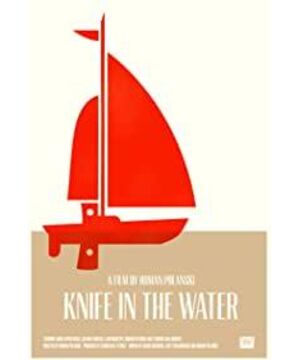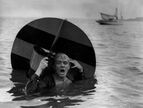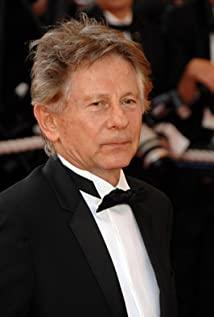This film is the debut and famous work of the internationally renowned director Polanski. After the film came out, it was acclaimed in the international film industry. In addition to winning at the Venice Film Festival, it was also nominated for the 1963 American Academy of Film and Television Award for Best Foreign Language Film. .
The film is good at prose style and psychological description. From the perspective of artistic style and ideological tendency, it was obviously influenced by the French New Wave films at that time.
First of all, it has very few characters, there are only three characters in the film, two men and one woman, and the background is very simple.
Except for the natural scenery, there is almost no social background. Therefore, it mainly relies on psychological communication and portrayal, and relies on the natural environment and the artistic conception of the scenery to attract viewers.
The three characters were on the same yacht. At first there was no conflict of interest. However, due to the different mentalities of the three, all kinds of contradictions and entanglements gradually accumulated: The owner Andrei is in the midst of his life journey, and he is defiant. The arrogance is abnormal; the college student is a nasty boy who is innocent and asks for each other, so he naturally seems to be swallowed and dominated by others. But he did not lose the true qualities of a man, and when his self-esteem was hurt, he was determined to protect it. As the hostess, Christina, she accompanies her husband on vacation, seeking joy. At first, she was relatively indifferent to college students, but as the daily interpersonal relationship was exposed layer by layer, her sympathy and attention gradually fell to the side of college students. The changes in the relationship between the three characters are subtle, but quite clear. It is often hidden between unknowingly and subconsciously revealing, and it is memorable.
The environment and natural scenery were photographed with poetic and sentiment, and some were anthropomorphic, reaching a state of blending scenery and emotions. The peaceful and distant lake; the float of a lone boat on the lake; the various postures of the heroine lying on the boat; the torrential rain that overwhelms the sky; the picturesque morning and evening, etc., are both beautiful pictures in themselves, and at the same time On the whole, it constitutes another world of life that is opposed to the secular and distracting thoughts. Although the film did not directly expose and criticize the bad phenomena of society, through the layers of exposure to Andrei's ugly nature, he increasingly showed a discordant tone with the people and scenery around him. This depiction of nature and human nature is consistent with the prose style of the entire film.
Because Polanski has adopted the style of prose culture, there are few people and pure scenery, which is convenient to convey the creator's mood and aesthetic inclination. Polanski's tendency to praise nature and praise human nature's innocent subjective ideation permeates every inch of film, especially the emotional changes between college students and Christina.
The love relationship between them does not have the usual ups and downs, violent love scenes, nor beautiful love language, but it is as natural and credible as in daily life. At first, this beautiful woman who was a bit proud of her husband had a direct eye on the shabby, cringing college student. It's the college student who secretly has a good impression and envy for this woman older than him from the bottom of his heart. However, on the balance of emotion and morality, Christina gradually had a tilt: to the college student who was obviously much more innocent than her husband, aroused a kind of affection. Especially when the college student fell into the water, her husband was unable to save her, which made her sympathy and love intertwined. This finally caused her to have a sudden erotic impulse when she was alone with college students. This kind of love expression is unexpected and in line with human feelings. It is more touching and more charming than the deliberately fabricated love episode.
In addition, Polanski tried his best to downplay the plot and external events. It almost makes people unable to see the beginning and ending of the story, and there is no common relationship between the beginning and the end of the plot. The beginning is the most common: a young man blocking a car on a highway, his identity, experience, etc. are not explained; the ending is also particularly plain: no university student who has come and goes without a trace; driving stays at the intersection of the intersection. Delei didn't know where to go.
The plot of the whole film basically takes place on the sailing boat. The cabin is not big, it is impossible to carry out violent dramatic actions. Everything seems so trivial and ordinary, or the mutual ridicule, dissatisfaction, ridicule, or the emotional expression and confrontation in the heart, eyes, and face are all displayed inadvertently. Compared with literature, it is often difficult for movies to grasp such scenes with watered down plots. This feature shows the artistic skills of the directors.
Secondly, the allegorical and conceptual tendency of the film is also more obvious. Pursuing the philosophicalization of life, using a certain artistic scene and even details to interpret and express the creator's worldview was exactly the fashion of certain modernist films in that period.
For example, the big jackknife of a college student is not a small prop in the ordinary sense, and the choreographer gives it a life idea. As college students claim: on the road of life, there is a great need for such a self-defense thing to resist evil and resist the bullying of others. His proficient and thrilling knife practice is not deliberately showing off his kung fu skills, but it reflects the unintelligible college student's alertness to the dangerous journey of life. But he sighed again: Once in the water, the knife was useless. This indicates that even with this well-known self-defense technique, it is impossible to overcome the dangers and evils of life. For another example, although Christina had a short and sincere relationship with a college student, her life experience and experience made her have a foreboding: "You (referring to the college student)...will become the same person as him!" This conclusion is pessimistic and world-weary. Love only exists for a short moment, and life and people are unpredictable.
The creative intention of the director is not only reflected in these specific details and the relationship between the characters, but also penetrates into the mood and artistic conception of the whole film, such as the vague lake scenery, the choice of intersections, and the continuous appearance of incidents. And so on, all give people the unpredictable idea of life.
Polanski's "Sword in the Water" is composed of an elegant and natural prose style, nuanced psychological analysis, and metaphors rich in philosophy of life. It constitutes an extraordinary prose poem that is refreshing, and is regarded by the international film community. Shock. In the second year of the film’s release, Polanski immigrated to the West and directed "Exclusion" (1965), "Desperate" (1966), "Vampire" (1966) and "Rosemary's Baby" (1968), "Chinatown" (1974), "Strange Tenants" (1977), "Tess" (1979) and other internationally acclaimed business cards.
View more about Knife in the Water reviews







